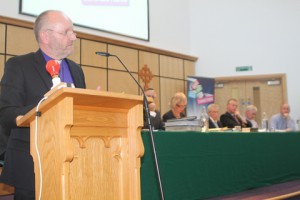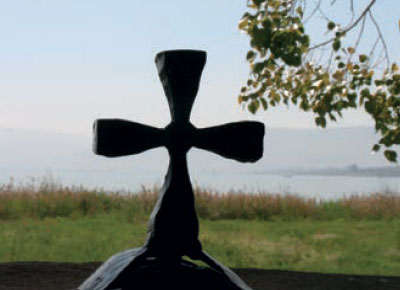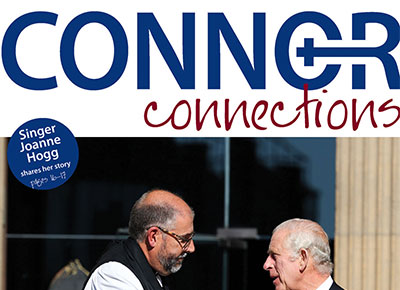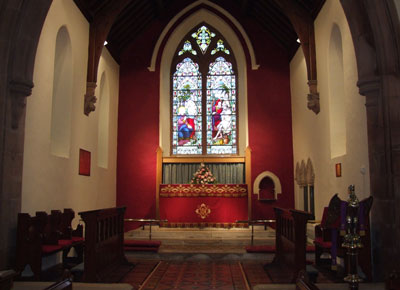Vision Strategy has energised diocese to connect with communities – Bishop
Connor’s Vision Strategy has energised the diocese to examine how it can connect more with the communities of which each parish is part, the Bishop of Connor, the Rt Rev Alan Abernethy told Diocesan Synod on October 1.
He paid tribute to those who had sought to find innovative ways to engage with more people, those who have re-energised youth and children’s ministry in the diocese, and outlined a new vision for ministry with the establishment of a Centre of Mission in North Belfast.
He said that the church, as God’s people, should be counter cultural and create a culture of encouragement and affirmation in a society soaked in a culture of blame and negativity.
“We should focus more on the good news or what we are doing well. This is not to deny the problems, but problems are best dealt with when we are looking up and out, rather than focusing inwards in a spirit of negativity,” the Bishop said.
“We are the Church and we need to stand together and build one another up. The spirit of negativity can haunt us and is very debilitating.”
He told Synod that the diocesan vision strategy was never seen as a panacea for all difficulties. “But I believe it has energised many to examine how we can connect more with our local communities. It has also reminded us that ministry is not just about the prerogative of the ordained. We have so many gifted people exercising ministry in our parishes and I want to thank them for their willingness to give and to serve,” Bishop Alan said.
He said parishes have sought to serve and engage with more people in very innovative ways. “We do need to find better ways of telling the stories of what is happening to encourage each other and to help us believe that we are making a difference,” the Bishop added.
Describing the re-energising of youth ministry as a joy, Bishop Alan said: “Young people do ask the difficult and even disturbing questions, but we need to give them space and encouragement to do so if they are to grow in the faith. They must be allowed to express their passion and energy that youth brings to us all as gift. Our leaders are also to be commended and recognised for the time and energy they bring to our young people.”
He said Children’s Project Development Officer Jill Hamilton offered new resources and support to those who want to help children on their faith journey, adding that Messy Church was also something more parishes are beginning to find helpful.
“We are called to serve in what appear as difficult times for the Church, but I also believe they are exciting because we have to discern and distil how best we can serve; we can no longer take it for granted that people will come to us, nor should we,” Bishop Alan said.
“We have been involved at the heart of some of the difficult and complex issues facing our communities and have been encouraged by the trust people have placed in us. It is through relationship and friendship that we can achieve most, not by shouting across barricades at each other in our divided society.
“There are still issues that cause us concern – our buildings and how they can be a drain on our energy and our finances. It can be difficult to get volunteers and leaders due to the hectic pace and pressures of daily lives. The Church has lost credibility in wider society and we can find it difficult to be heard.
“There are complex moral and ethical issues that cause us internal division and how we can handle conflict and disagreement is something we are constantly facing.”
The Bishop continued: “Leadership in the Church is not easy and yet we have so much in terms of resources and other people walking with us that we must not be weighed down by problems, but, instead, we must pray that we might see them as opportunities and pray for the courage to move forward in faith.”
He said society was changing rapidly. “There are the issues of local politics and an Assembly that finds it difficult to make decisions in a collaborative way. The issues of flags, parades and the past still destabilise and hinder us from moving forward,” the Bishop said, adding that his Lent course would be on the theme of change.
Bishop Alan said that as part of the diocese’s development and strategic plans, a partnership had been set up with the Church Army. “We have agreed with them to create a centre of mission for the Diocese of Connor which will have a particular focus in North Belfast. This has been recognised as an area of deprivation and, in particular, is in need of education, education and education,” the Bishop said.
Two Church Army staff trained in pioneer ministry will focus on establishing new communities of faith, and will also seek to train and equip parishes and people across the diocese in what this might mean for each and every context, the Bishop said.
“I certainly believe I can no longer just dream about these things, but we need to step out and see where this journey might lead us.
“This will offer new opportunities for training for everyone, whether ordained or not. I want every member of the Church of Ireland to feel confident in their faith and to be resourced as they seek to live it.”
Guest speaker at the Synod was Neil Hudson of the Centre for Contemporary Christianity. Neil, Bishop Alan said, would challenge the church to see how what it does on a Sunday equips and enables everyone to live out their discipleship during the rest of the week.
“It is in our homes, the workplace and in our local communities that we are called to live out our faith and be disciples as fellow-travellers and learners,” Bishop Alan said.
Outlining the ‘difficult decision’ not to take a team to Yei Diocese in South Sudan, Bishop Alan said the diocese was finding ways of offering on-going support to Yei. “This is part of the mission of God that we must continue to support, as it helps us to look beyond ourselves and be in partnership with the worldwide Church.”
Reports of Diocesan Council, Boards and Committees were approved during the afternoon session of Synod, when the new diocesan website was launched by Chris Colhoun from Lairdesign, who built the responsive site, and Diocesan Communications Officer Karen Bushby.
Many tributes were paid during the business session to Diocesan Development Officer Trevor Douglas and Children’s Officer Jill Hamilton for the work they have been doing in parishes in the diocese.
The Rev Andrew Forster gave a presentation from the Commission on Episcopal Ministry and Structures, and there was some group work as Synod delegates debate questions raised by this.
After dinner, served to more than 200 people by the brilliant catering team at St Nicholas Parish Halls, a video was shown illustrating the work of Jill and the Engage Connor Youth team led by the Rev Peter Ferguson.
In an engaging and humorous presentation, Neil Hudson addressed the topic ‘Beyond Sundays’: Living faith-full lives Monday-Saturday.
In this, Neil explored the idea of giving people a sense of ownership for the places where they find themselves most of the time and a framework for understanding how they might serve God’s purposes there.
In a pre-Synod session for clergy earlier in the day, Neil led a session entitled ‘Beyond Caring’: How can we create church communities that equip disciples rather than just care for Christians?
At close of Synod, Bishop Alan was thanked for everything he does by the Rev Canon Nigel Baylor.
The Bishop of Connor’s presidential address in full
He is one of my favourite characters because of how he helped others to believe both in themselves and the gifts they had been given.
Barnabas, “son of consolation or of encouragement”, was the sponsor of Paul in Jerusalem and the person who drew Paul into the leadership team of the Church in Antioch and accompanied him on his first mission journey.
I am conscious from my own experience that the one negative critical remark stays much longer in the memory than the encouraging word. Criticism can sting, particularly if it is not given with grace and support. We all need to hear positive criticism, so as we can learn and be better at what we do and, indeed, become better disciples.
However, we live in a culture that has become very quick to complain, to criticise and, as my granny would have said, we “gurn a lot”. We are soaked in a culture of blame and negativity; it is always someone else’s fault and we need someone to blame. One example of this is our health service, where, every day in this province, hundreds of people are helped and supported and given exceptional care and yet we only ever hear of the cases where things were not dealt with well.
Our teachers face similar difficulties, when parents cannot see any fault in their child and so much of the ills of our young people are blamed on the teachers.
We, as God’s people, are meant to be counter cultural and one of the key ways we can do this is by creating a culture of encouragement and affirmation. We should focus more on the good news or what we are doing well. This is not to deny the problems, but problems are best dealt with when we are looking up and out, rather than focusing inwards in a spirit of negativity.
Within Church life, we can seek to find fault so easily, with the bishop, the rector, the diocese or those people who mysteriously seem to wield power. We are the Church and we need to stand together and build one another up. The spirit of negativity can haunt us and is very debilitating. It can also divide us into various factions and interest groups, rather than seeing ourselves as one in Him, even when we may disagree. So, today, I want to encourage and affirm because I can see so many signs of life, energy and commitment to a better future.
Our vision strategy was never seen as a panacea for all our difficulties, but I believe it has energised many to examine how we can connect more with our local communities. It has also reminded us that ministry is not just about the prerogative of the ordained. We have so many gifted people exercising ministry in our parishes and I want to thank them for their willingness to give and to serve.
There have been some very innovative ways in which parishes have sought to engage with more people and there has been a willingness to serve. It is dangerous to be selective in this, but we do need to find better ways of telling the stories of what is happening to encourage each other and to help us believe that we are making a difference. To express our love of God in these ways is part of our witness to what He has done for us.
It has been a joy to see the re-energising of our youth ministry and to be with so many young people and leaders in Castlewellan Castle last month was inspiring. Young people do ask the difficult and even disturbing questions, but we need to give them space and encouragement to do so if they are to grow in the faith. They must be allowed to express their passion and energy that youth brings to us all as gift. Our leaders are also to be commended and recognised for the time and energy they bring to our young people.
There some more youth events before the end of this calendar year: on 4th October in Muckamore and on 13th December in Antrim. Thanks to the Revd Peter Ferguson and his team for their leadership and their enthusiasm for this ministry.
We are also very blessed by the number of volunteer leaders we have who give of their time and energy to minister with our children. Jill has enjoyed building networks across the diocese and has been impressed by the level of care and commitment shown by our leaders.
Children have such a different experience in school than I had and, indeed, many of us had. They have much more interactive and creative ways of learning and it is great that Jill has been able to offer new resources and support to those who want to help our children on their faith journey.
There are many resources available through the new diocesan website. There are training events and opportunities to gather children and leaders together to encourage and inspire. Please remember and support the events this month that Jill has organised: the Children’s Days on 4th, 11th and 18th October in Ballymoney, Jordanstown and St Paul’s, Lisburn.
Messy Church is also something more parishes are beginning to find helpful and it is great that Jill has been given recognition of her role in this. Thanks to Jill for her ability to inspire and encourage others and by her hands-on approach.
I have also been very encouraged to see many parishes find new ways of engaging with their local communities, some involving buildings or outside funding and others making simple connections by alternative worship or by serving the community in uncomplicated ways. There is energy and creativity that I am delighted to commend and recognise.
We our called to serve in what appear as difficult times for the Church, but I also believe they are exciting because we have to discern and distil how best we can serve; we can no longer take it for granted that people will come to us, nor should we.
We have been involved at the heart of some of the difficult and complex issues facing our communities and have been encouraged by the trust people have placed in us. It is through relationship and friendship that we can achieve most, not by shouting across barricades at each other in our divided society. The Church has to find ways of incarnating the presence of Jesus wherever we are called to serve.
Last year, I spent nearly a week in Ballintoy and Dunseverick as part of my commitment to being a leader in mission, as that is a key part of the bishop’s role. This year, I spent part of a week in Randalstown and, next year, I have arranged to be in Cloughfern. These are important moments for me to have quality time in a parish and to encourage that parish to engage with the community. It has also been a joy to spend Holy Week in a different parish each year; this year, it was Christ Church, Lisburn, and, next year, it will be Ballymena.
So let us encourage one another and find ways of telling our stories so that we can continue to build one another up and witness to the God who calls us to His mission. Later in this Synod, we will launch our new diocesan website that will be very helpful in terms of helping with resources and helping us tell the stories of what is happening across the diocese.
However, I must emphasise that if Karen doesn’t receive the stories or isn’t told what is happening so as she can write the stories, we cannot tell them. Please, please help her to help us encourage one another and build each other up as we share our stories.
There are still issues that cause us concern – our buildings and how they can be a drain on our energy and our finances. It can be difficult to get volunteers and leaders due to the hectic pace and pressures of daily lives. The Church has lost credibility in wider society and we can find it difficult to be heard. There are complex moral and ethical issues that cause us internal division and how we can handle conflict and disagreement is something we are constantly facing. Leadership in the Church is not easy and yet we have so much in terms of resources and other people walking with us that we must not be weighed down by problems, but, instead, we must pray that we might see them as opportunities and pray for the courage to move forward in faith.
Society has changed beyond recognition and the speed of change is rapid. These are genuine difficulties, but together we are called to live out our faith in the complexity of our culture and know that, somehow in the confusion, our God is with us. There are the issues of local politics and an Assembly that finds it difficult to make decisions in a collaborative way. The issues of flags, parades and the past still destabilise and hinder us from moving forward. Please pray for those who govern us that they will be given wisdom to help us move to a better future.
For my Lent course next year, I will be discussing the theme of change, recognising how difficult it can be, why change is important and how we can best help us all face whatever change is necessary.
As part of our vision strategy, we have also been looking at how we can grow new communities of faith and enable every parish to engage with the mission to which we are called in creative ways that enable us to be true to our Anglican roots but also inspire and equip us.
Many of you, like me, are very comfortable in what we know and find it difficult to move outside our comfort zones, but it is obvious in our present culture that we need to think and act creatively as we engage with the many who have no connection with Church. I have found our conversations and engagement with Church Army very stimulating and inspiring.
As part of our development and strategic plans, we have agreed a very exciting project and partnership between the diocese and Church Army. We have agreed with them to create a centre of mission for the Diocese of Connor which will have a particular focus in North Belfast. This has been recognised as an area of deprivation and, in particular, is in need of education, education and education.
This project involves two Church Army staff trained in pioneer ministry to focus on establishing new communities of faith. However, they will also be seeking to train and equip parishes and people across the diocese in what this might mean for each and every context. They bring experience in this new model of ministry and have much to offer us in terms of personnel and resources. They are delighted to partner with us and see this as an exciting development for them and, indeed, for the Church of Ireland.
I certainly believe I can no longer just dream about these things, but we need to step out and see where this journey might lead us. Some may say that we have invested huge resources in this part of the city and they are right, but we are now being intentional in what we are doing and it is for the whole diocese. We are also ensuring that the green shoots that have been happening there are not lost. I believe that this new project will help the whole diocese, as we continue to look to the future with hope and also with an intentionality to try new things and take risks for the sake of the kingdom.
This will offer new opportunities for training for everyone, whether ordained or not. I want every member of the Church of Ireland to feel confident in their faith and to be resourced as they seek to live it. We are seeking to find new ways of offering training and resources to everyone in ministry, particularly those who are not ordained.
There is a new group working with Trevor Douglas to bring focus and direction to this and our link with Church Army will also help us in this facilitation. I am very grateful to Trevor, who has brought such energy to development across the diocese, and the team working with him are all being so energised and creative, including Jill, Peter and Karen. He is also a great support to me.
With the Revd Neil Hudson with us at Synod, we are also being challenged to see how what we do in church on a Sunday equips and enables all of us to live out our discipleship during the rest of the week. I have for a long time been concerned that what we do together on a Sunday can have little connection with what many of us face throughout the rest of the week. It is in our homes, the workplace and in our local communities that we are called to live out our faith and be disciples as fellow-travellers and learners. During the Lent course this year, I reflected on this critical aspect of how we are learners together. We are called to live out our baptismal promises wherever we are. I believe that our centre of mission will challenge and inspire us as we continue to journey together and respond to what is the mission of God to bring light to darkness and hope to despair.
I have had to make a difficult decision not to take a team to Yei Diocese in South Sudan next January. We were unable to travel this year and I am unwilling to take the risk of travel yet, particularly when I am responsible for the safety of others. We are finding ways of offering our on-going support to Yei and you should have some information on your seats. This is part of the mission of God that we must continue to support, as it helps us to look beyond ourselves and be in partnership with the worldwide Church.
Finally, my thanks to all the staff in the Diocesan Office for their support and hard work, especially for helping us make today happen and for ensuring that we have been able to fulfil our obligations with our various elections.
To our rural deans who help and encourage and help during vacancies and sickness duty.
To our two deans and it is a joy to see Dean John Bond doing so well. Thanks also to the other Dean John and to commend him particularly for the new choirs and daily services and many of them sung. Thanks to Trevor, Jill, Karen and ‘the boss’, Rosemary.
We have much laughter in the office and I am very grateful for their loyalty and encouragement. Thanks too to my three wise men, the archdeacons, for their encouragement, hard work, and, above all, their friendship.
Lastly to my family – a wonderful gift to me as they are such strong supporters and fans. Next year, both our children are getting married within two weeks of each other, so another chapter in our family begins and the bank balance takes a hammering!
Thank you to all the clergy and people for your support and prayers.
Above all, thanks be to God who loves us beyond our comprehension and who walks with us always!!
Amen
Photo Gallery from 2014 Synod
© Copyright The Church of Ireland Diocese of Connor 2025 | Web Design by LD2.digital



































































